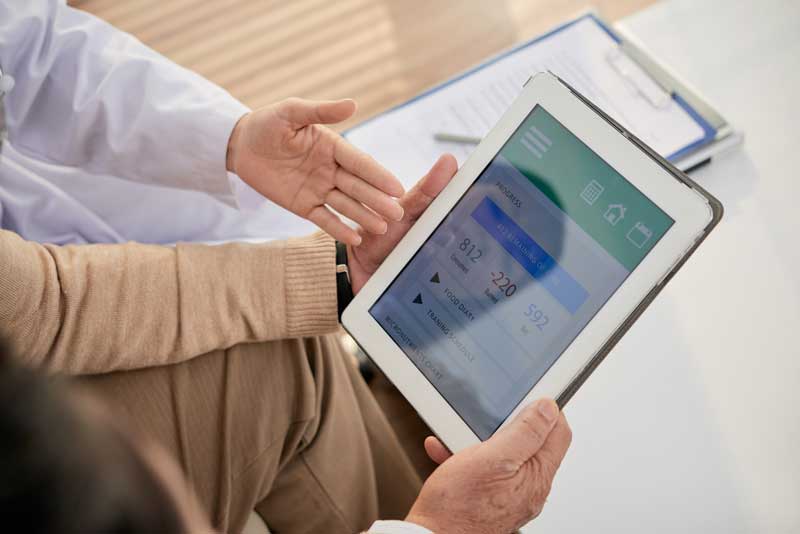
The healthcare sector faces many challenges, including rising costs, a shortage of qualified staff and the need to improve the quality of care. Digitizing medical processes offers a promising solution to these challenges by streamlining operations, improving care coordination and promoting informed decision-making. This white paper explores the emerging technologies and solutions shaping the digital transformation of the healthcare sector, highlights the benefits for patients and professionals, and presents case studies illustrating the successful implementation of these initiatives.
According to a study by the Agence du Numérique en Santé, by 2021, only 37% of French healthcare facilities had reached an advanced level of digital maturity.[1] However, the COVID-19 pandemic has accelerated the adoption of digital technologies, with a 25% increase in investment in telehealth solutions between 2019 and 2021.[2]
Digital health, or e-health, is a recent concept that refers to the use of digital technologies to improve healthcare services and processes. It encompasses a wide range of digital solutions, such as electronic medical records, mobile health monitoring applications and telemedicine, aided by artificial intelligence.
Digital technologies have the potential to radically transform the healthcare sector, offering significant benefits for patients and professionals alike. They enable better care coordination, fewer medical errors, more personalized treatments and greater patient involvement in monitoring their own health thanks to mobile health apps. What’s more, the digitization of medical processes paves the way for innovations such as preventive care, promising improved overall health for the patient and a significant reduction in long-term costs for institutions.
The digital transformation of the healthcare sector is fueled by a variety of emerging technologies. Here are just a few of them.
EMRs centralize patient medical information in a secure digital system, improving accessibility and care coordination. By 2022, the EMR adoption rate in French hospitals was 78%, compared with just 52% in 2018[3].
AI and machine learning enable in-depth analysis of healthcare data, facilitating early diagnosis, personalized treatment and the discovery of new therapies. The French healthcare AI market is expected to reach 1.2 billion euros by 2025, with an annual growth rate of 28%.[4]
Telehealth solutions, such as teleconsultation and remote patient monitoring, improve access to care, particularly in underserved areas. In France, the number of teleconsultations rose by 920% between 2019 and 2020, from 500,000 to 5.1 million[5].
These devices, such as wearable sensors and mobile applications, enable real-time monitoring of patients’ health parameters, promoting proactive care. The French market for connected healthcare applications and objects is expected to reach 5.5 billion euros in 2025, up from 1.7 billion in 2020, representing annual growth of 27%” according to the government’s October 18, 2021 report entitled Stratégie d’Accélération, Santé Numérique.
Strasbourg University Hospital has implemented an AI system to optimize patient flow management in the emergency department. AI analyzes incoming patient data in real time, such as symptoms, medical history and test results, to prioritize the most urgent cases. This approach has reduced waiting times by 30% and improved the quality of care.
Doctolib, a French start-up, has developed an online platform enabling patients to book appointments simply and efficiently. By 2022, the platform had more than 300,000 registered healthcare professionals and had facilitated the booking of 200 million appointments. This digital solution improves access to care and reduces administrative costs for healthcare professionals.
The e-Parcours project, launched in 2021 by the Institut Curie and several Parisian healthcare institutions, aims to improve care coordination for cancer patients. A secure digital platform enables patient records, treatment plans and test results to be shared between the various care providers involved. This initiative has reduced treatment times by 40% and improved patients’ quality of life.
To reap the full benefits of digitizing medical processes, healthcare organizations need to adopt a strategic, holistic approach. Here are some key recommendations.
Define a clear vision and measurable objectives for digital transformation, in alignment with the organization’s strategic priorities.
Set up robust, secure infrastructures to support digital initiatives, paying particular attention to the protection of sensitive healthcare data.
Provide adequate training for medical and administrative staff to facilitate the adoption of new digital technologies and processes.
Foster partnerships with other healthcare facilities, regulatory authorities and technology companies to accelerate innovation and the adoption of best practices.
Set up monitoring and analysis mechanisms to assess the impact of digital initiatives and identify areas for continuous improvement.
The digitization of medical processes is an essential catalyst for tackling the challenges facing the healthcare sector. By leveraging emerging technologies such as EMRs, AI, telehealth and connected devices, healthcare facilities can improve operational efficiency, care coordination and the quality of services offered to patients.
Although progress is encouraging, there is still some way to go for widespread adoption of digital solutions in the French healthcare sector. A strategic approach, adequate investment and cross-sector collaboration will be essential to accelerate this transformation.
Inibar Services’ recognized expertise in information technology and digital transformation makes it an ideally positioned partner to support healthcare establishments on their digitalization journey. By leveraging its 25 years of experience and innovative tailor-made solutions, and its in-depth knowledge of the healthcare market, Inibar Services can help facilities implement successful digital strategies, optimize and secure their processes, reduce staff stress and deliver superior patient care.
[1] https://www.saucewriting.com/guides/contenu-editorial
[2] https://www.journaldunet.com/martech/1181529-le-marketing-de-contenu-au-coeur-de-la-transformation-digitale-des-entreprises-b2b/
[3] https://www.studyrama.com/formations/fiches-metiers/publicite-marketing
[4] https://help.hootsuite.com/hc/fr/articles/4403597090459-Cr%C3%A9er-un-contenu-de-m%C3%A9dias-sociaux-attrayant-et-efficace
[5] https://www.hec.edu/fr/executive-education/actualites/le-marketing-levier-de-creation-de-valeur
The healthcare sector faces many challenges, including rising costs, a shortage of qualified staff and the need to improve the quality of care…

